Corsair AX1500i Titanium PSU Review
Today, we're taking a look at Corsair's flagship power supply unit. The AX1500i is a digital, 1500 watt, 80 PLUS Titanium-rated beast of a PSU!
Why you can trust Tom's Hardware
Transient Response Tests
Advanced Transient Response Tests
For details on our transient response testing, please click here.
In these tests, we monitored the response of the PSU in two different scenarios. First, a transient load (10A at +12V, 5A at 5V, 5A at 3.3V and 0.5A at 5VSB) was applied to the PSU for 200ms while the PSU was working at 20 percent load. In the second scenario, the PSU was hit by the same transient load while operating at 50 percent load. In both tests, we used our oscilloscope to measure the voltage drops caused by the transient load. The voltages should have remained within the ATX specification's regulation limits.
These tests are crucial because they simulate the transient loads a PSU is likely to handle (such as booting a RAID array, an instant 100 percent load of CPU/GPUs, etc.). We call these tests "Advanced Transient Response Tests," and they are designed to be very tough to master, especially for a PSU with a capacity of less than 500W.
Advanced Transient Response at 20 Percent
| Voltage | Before | After | Change | Pass/Fail |
|---|---|---|---|---|
| 12V | 11.978V | 11.904V | 0.62% | Pass |
| 5V | 4.996V | 4.931V | 1.30% | Pass |
| 3.3V | 3.305V | 3.202V | 3.12% | Pass |
| 5VSB | 4.968V | 4.932V | 0.72% | Pass |
Advanced Transient Response at 50 Percent
| Voltage | Before | After | Change | Pass/Fail |
|---|---|---|---|---|
| 12V | 11.987V | 11.915V | 0.60% | Pass |
| 5V | 5.001V | 4.932V | 1.38% | Pass |
| 3.3 V | 3.304V | 3.183V | 3.66% | Pass |
| 5VSB | 4.961V | 4.915V | 0.93% | Pass |
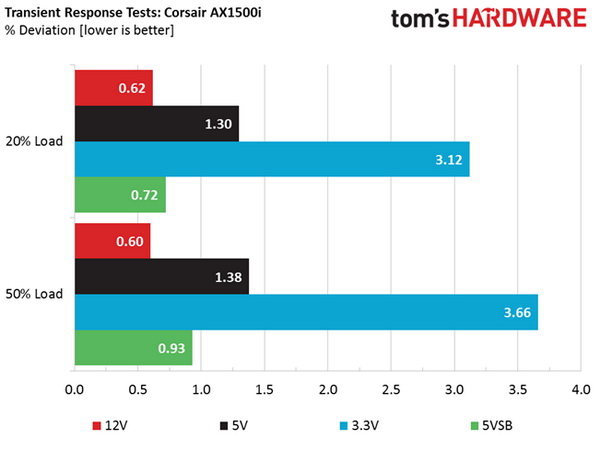
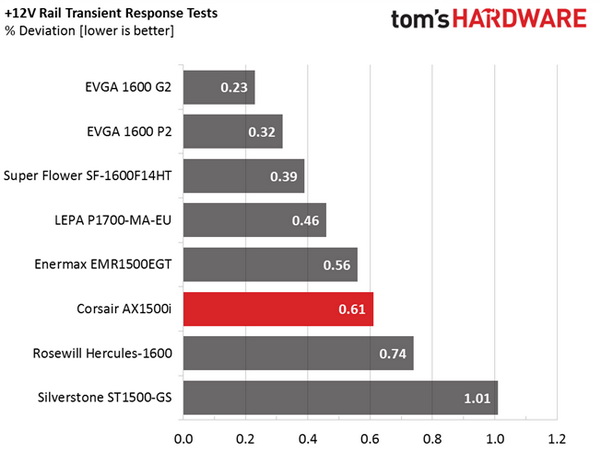
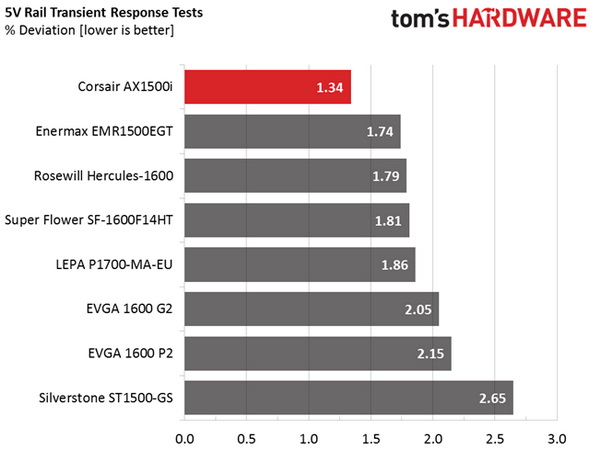
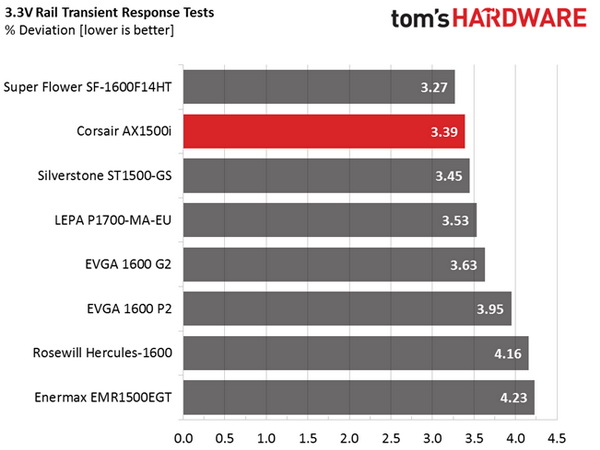
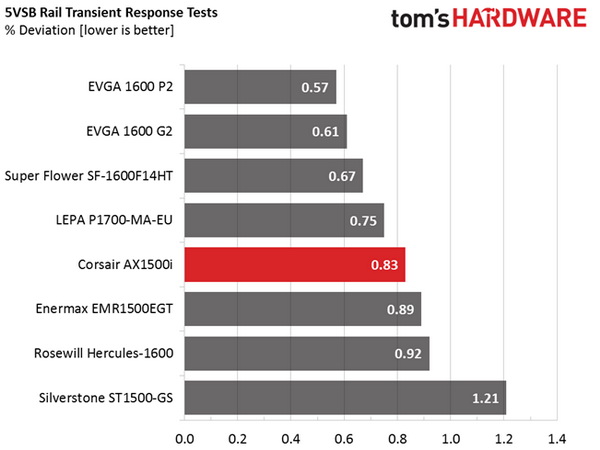
The response in transient loads was very good on the +12V, 5V and 5VSB rails, however, we expected to see better results on the 3.3V rail. In general, we don't want to see readings below 3.2 V on this rail. During the second test, the transient load dropped for a very short period of time on this specific rail to 3.18 V.
Here are the oscilloscope screenshots we took during Advanced Transient Response Testing.
Transient Response At 20 Percent Load
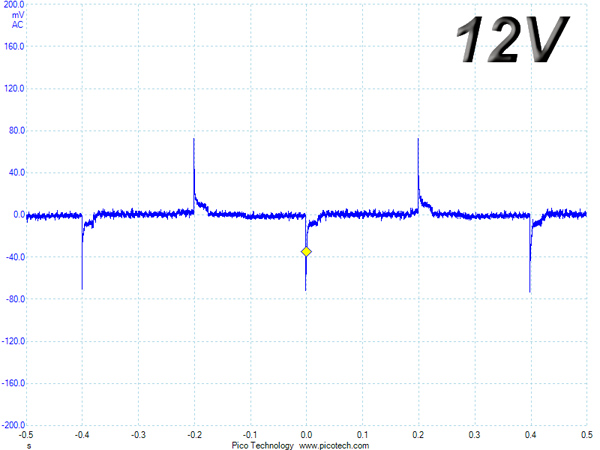
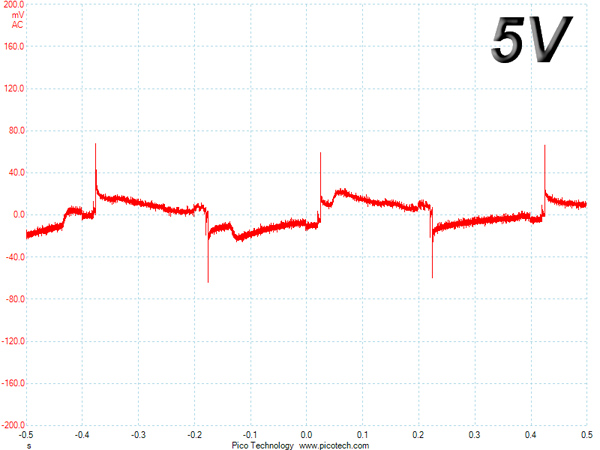
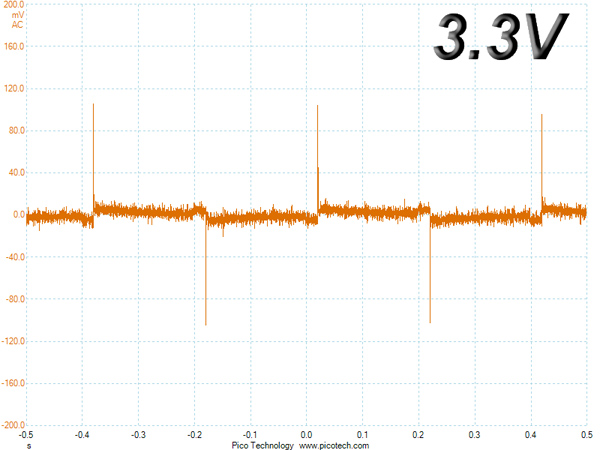
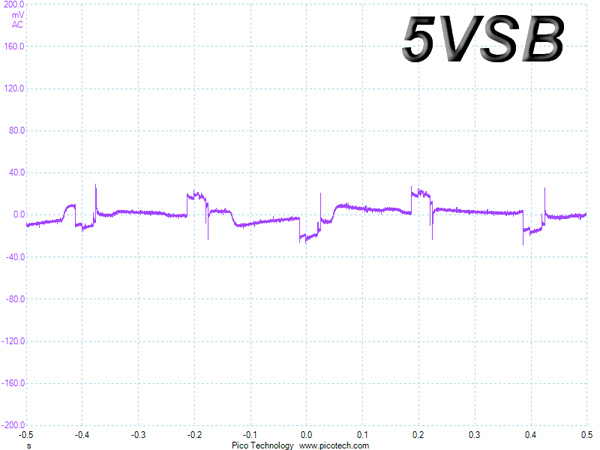
Transient Response At 50 Percent Load
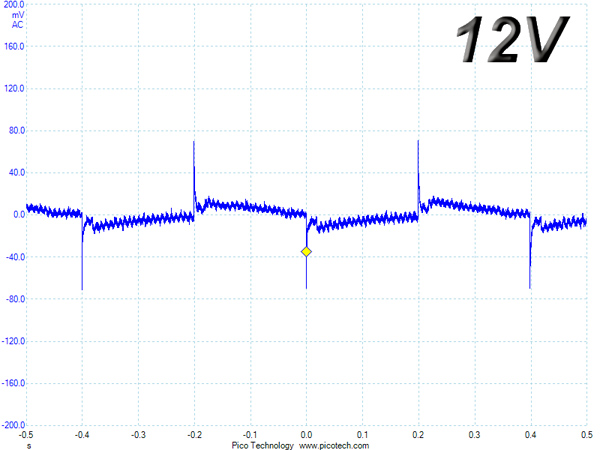
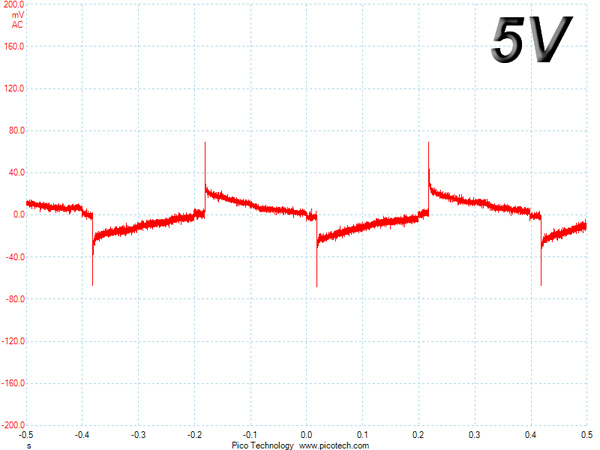
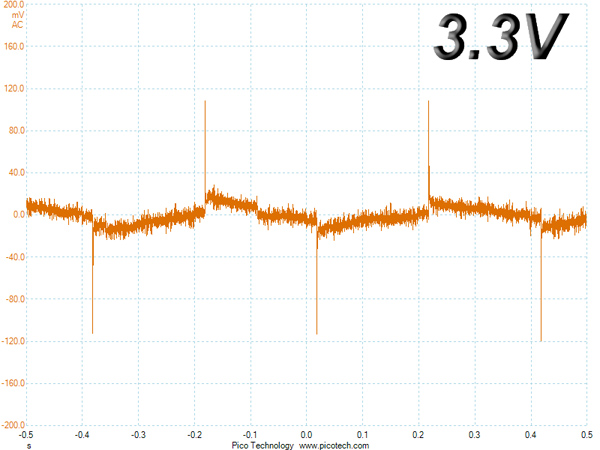
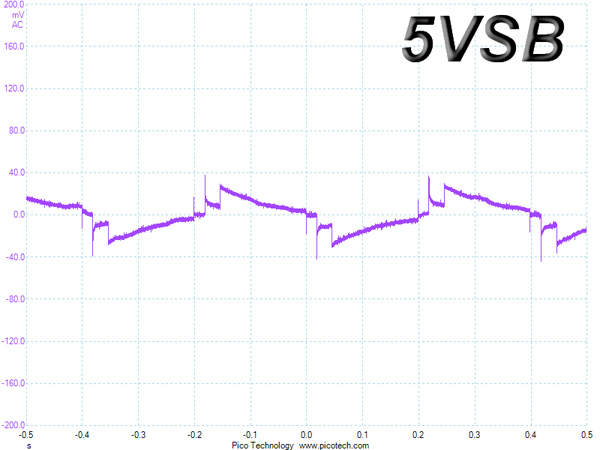
Turn-On Transient Tests
In the next set of tests, we measured the response of the PSU in simpler transient load scenarios during the PSU's power-on phase.
For the first measurement, we turned off the PSU, dialed in the maximum current the 5VSB could output and switched on the PSU. In the second test, we dialed the maximum load the +12V could handle and started the PSU while it was in standby mode. In the last test, while the PSU was completely switched off (we cut off the power or switched off the PSU via the on/off switch), we dialed the maximum load the +12V rail could handle before switching on the PSU from the loader and restoring the power. The ATX specification states that recorded spikes on all rails should not exceed 10 percent of their nominal values (+10 percent for 12V is 13.2V and 5.5V for 5V).
Get Tom's Hardware's best news and in-depth reviews, straight to your inbox.
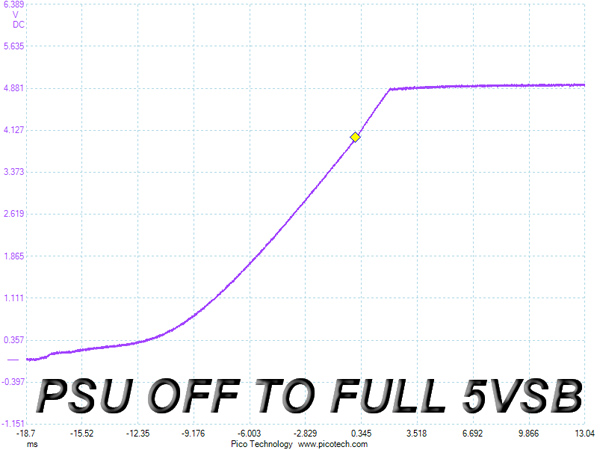
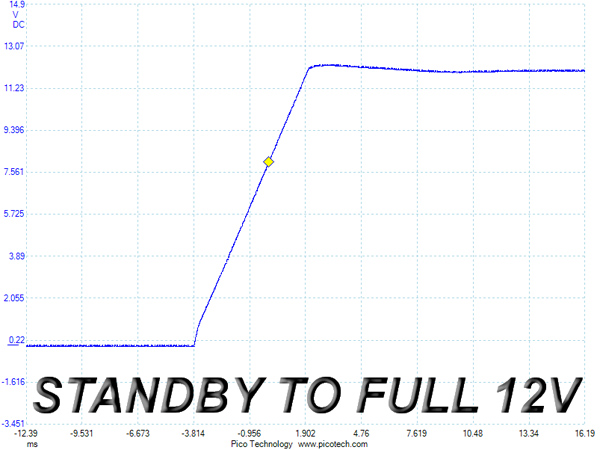
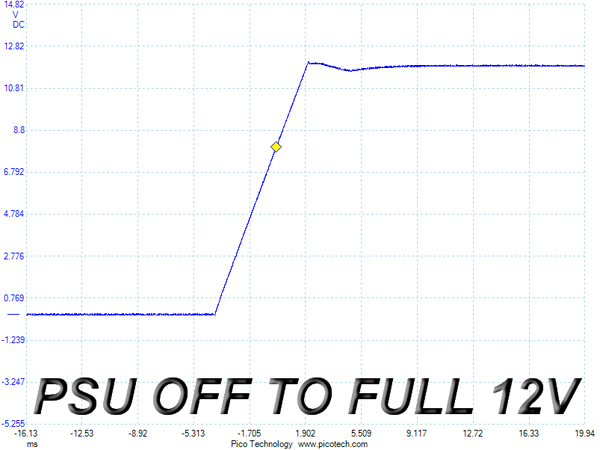
Our tests show very good overall performance, although the PSU instantly delivered 1.5 kW of power during the last two tests from either standby or "off" states. In addition, the 5VSB slope was just perfect.
Current page: Transient Response Tests
Prev Page Cross-Load Tests And Infrared Images Next Page Ripple Measurements
Aris Mpitziopoulos is a contributing editor at Tom's Hardware, covering PSUs.
-
Nuckles_56 For such an expensive unit, why on earth did they put the CapXon caps in rather than a complete set of Japanese ones?Reply -
basroil Wow, this thing has almost as good of regulation and transient responses as the Seasonic 660XP2! And at 1500W no less... Might be a good PSU for not just 4-way K80 workstations, but also powering 12VDC robots too!Reply -
mctylr ReplyCorsair's flagship power supply unit (PSU) offering, the AX1500i, is the best PSU money can buy today, according to many experts in the field.
Honestly?! Do you believe that anyone can reasonably assume that this is an impartial, unbiased review when that is the review's opening?
Argument from authority (or appeal to authority) isn't what I expect from a Tom's Hardware review. -
Bossyfins ReplyCorsair's flagship power supply unit (PSU) offering, the AX1500i, is the best PSU money can buy today, according to many experts in the field.
Honestly?! Do you believe that anyone can reasonably assume that this is an impartial, unbiased review when that is the review's opening?
Argument from authority (or appeal to authority) isn't what I expect from a Tom's Hardware review.
He said to many others in the field. Pretty sure he is not implying himself. -
jimmysmitty Reply16665297 said:For such an expensive unit, why on earth did they put the CapXon caps in rather than a complete set of Japanese ones?
They are polymer caps, as mentioned, which might not make a difference even if they went with Japanese caps. In fact looking at the results even some that probably have all Japanese caps got beaten in many areas. -
Eggz Good review, but please do something about the large arrows blocking the garphs' labels. I can't read what the data actually presents with that info blocked.Reply
As for the actual unit, we know it's good. This thing's been out for about a year now. We at least now have conformation from a pretty reliable source, so thanks for that!
And for this:
Argument from authority (or appeal to authority) isn't what I expect from a Tom's Hardware review.
What is wrong with appealing to authority? I don't know astrophysics, but I can tell you something about it if an astrophysics professor tells me about it. And how would the professor learn his basic knowledge before becoming a professor? Text books, probably. Who wrote those? Ah, yes authorities in the field!
Dismissing references to authorities, as a non-expert, is stupid. It's essentially saying "Since this person has dedicated his (or her) entire life to researching this topic, I will definitely make up my mind on that topic without considering what he (or she) has to say about it." That falls right under the definition of intentional ignorance.
To be fair, though, the article didn't cite to an actual authority. It assumed that the readers will have familiarity with other rigorous review sites like Jonny Guru, who reviewed the AXi1500 back in April of 2014, giving it the only 10/10 ever with the following comment: http://www.jonnyguru.com/modules.php?name=NDReviews&op=Story&reid=378
I was starting to think nobody would ever send me a unit good enough. People, THIS is what it takes to get a perfect total score from me. Might be the last time you see it, too. Goes without saying I need to slap in that good old recommended logo right here
-
mctylr Reply16667641 said:Argument from authority (or appeal to authority) isn't what I expect from a Tom's Hardware review.
What is wrong with appealing to authority? I don't know astrophysics, but I can tell you something about it if an astrophysics professor tells me about it.
Dismissing references to authorities,
Argument from authority is not about presenting or relaying knowledge from a known authority, but the premise that the argument(*) should be accepted on the basis that it came from an authority, not that the argument should be evaluated and (conditionally) accepted based on its own merit.
(*) or in this context a review
Perhaps I was sloppy in my usage. My concern is that by making such a reference to unspecified experts' opinions, introduces a potential cognitive bias, namely that the reviewer (Aris) expected the review unit to perform to those expectations, and not necessarily report with an impartial review of the unit as received and as actually measured.
While I assume the power supply is of excellent quality, and I have no reason to expect any intentional or deliberate wrong-doing, the opening of a review with such a reference of praise, suggests that they reviewer could be subtlety influenced by these expectations during the review process.
In my opinion such a reference to other reviews / opinions does not belong in a review introduction, but if mentioned it should be brought up during the conclusion of the review.
-
Amdlova I see some corsair s... inside its not better than an evga power, Seasonic all for the win!Reply -
iam2thecrowe Reply16667294 said:16665297 said:For such an expensive unit, why on earth did they put the CapXon caps in rather than a complete set of Japanese ones?
They are polymer caps, as mentioned, which might not make a difference even if they went with Japanese caps. In fact looking at the results even some that probably have all Japanese caps got beaten in many areas.
Here's some opinions of capxon caps: http://www.badcaps.net/forum/showthread.php?t=20979
I know I wouldnt trust them, have seen too many blow, and theres really no reason to cheap out on such a high end psu. But, the reason they used them may have been due to sizing, availability of those specs or something else....... They might measure well when theyre new, but will they last?..... This is something a review can never tell us unfortunately. I guess as long as theyre rated generously, they should be ok, polymer caps will have much less tolerance to overvoltage. -
Eggz Reply16668249 said:
My concern is that by making such a reference to unspecified experts' opinions, introduces a potential cognitive bias, namely that the reviewer (Aris) expected the review unit to perform to those expectations, and not necessarily report with an impartial review of the unit as received and as actually measured.
That's a fair concern generally, but the reasons giving rise to it seem misplaced. The particular place in a review that someone gives praise - beginning, middle, or end - doesn't make much of a difference for anyone who edits their writing, which I'm sure this reviewer does. It's actually good practice to open with lessons learned for this type of article; otherwise, the piece would be meandering and simply take readers through the experimentation process in real time. That's boring and would probably decrease readership.
As for whether to mention (or allude to) other reviews at all, I am not sure it's a good idea for Tom's reviewers to intentionally ignore other reputable reviewers. In all likelihood, many of them are acquaintances from various trade shows. But more importantly, I'd expect a Tom's reviewer to have read all other serious reviews before writing his own. Without doing that, they'd run the risk of writing repetitive information, or worse, writing a less informative review than others currently available. Being familiar with the work of others in your field is part of what builds credibility.
I'm not trying to say that we should pretend Tom's is immune to fallacious logic. It's good to think about those things. My point is just that it didn't seen to present a real problem here.